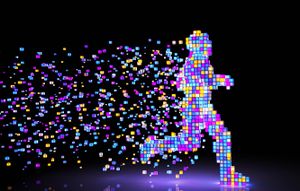New Media: Potential Exam Questions covid-19: day 46 | US: GA | info | act
Prepared for NMAC 4460, Spring 2020. Use the questions below to study for your final exam scheduled for Thursday, April 30, 10:30a–12:30p.

- McLuhan states “the ‘content’ of any medium blinds us to the character of the medium” (203). And later: “any medium has the power of imposing its own assumption on the unwary” (206). How do you understand these assertions in relation to McLuhan’s definition of medium and why are they important to understanding new media?
- How does the use of new media help us better understand ourselves as humans? Use at least three texts we have read this semester in your answer.
- Discuss the ideas of democracy and openness (as in “open source”) as they relate to new media. Use at least three texts we have read this semester in your answer.
- What crucial ideas from the foundational thinkers—Bush, Licklider, Wiener, Bolter—that we read influenced our current understanding and use of new media?
- Discuss Negroponte’s metaphor of “being digital” in relation to the hacker. What key qualities do they share? Use at least three texts we have read this semester in your answer.
- “New media studies involve the digital technologies of human participation and communication, and the study of the social and cultural changes that these technologies precipitate.” Support this statement using at least three texts we have read this semester.
- “New media is often contrasted with the media industries of the 20th-century: film, television, and radio.” Support this statement using at least three texts we have read this semester.
- “New media decentralize media control and production. They promote an amateur culture of remix that shares the power of production with the consumer.” Support this statement using at least three texts we have read this semester.
- “Media which was once separate and compartmentalized can now be combined into new forms. . . . It allows users the freedom to play and explore and could one day offer an immersive experience as meaningful as a Shakespeare tragedy.” Support this statement using at least three texts we have read this semester.
- In her 1987 essay “A Cyborg Manifesto,” Donna Haraway warns of the “informatics of domination,” or those forces who would use new media to (re)establish an even greater control of our psychic and daily lives. Consider recent events that would seem to support this idea. Be sure to include a discussion of The Great Hack and “The Californian Ideology.”
- “None of us can know everything; each of us knows something; we can put the pieces together if we pool our resources and combine our skills. Collective intelligence can be seen as an alternative source of media power.” Discuss this argument in relation to the Digital Humanities.
- In “The Cathedral and the Bazaar,” Eric Raymond states “Given enough eyeballs, all bugs are shallow.” What does he mean and how does this statement relate to Digital Humanities, specifically, and new media in general? You might discuss your own experience with Wikipedia here.
- In “The Cathedral and the Bazaar,” Eric Raymond states “To solve an interesting problem, start by finding a problem that is interesting to you.” Contextualize this idea and show how it relates to the participatory aspect of new media. Use at least two other texts.
- Discuss the idea of the human body as medium using at least three texts we have read for this semester.
- Construct an essay of your choosing about any three texts we have read for this semester.
